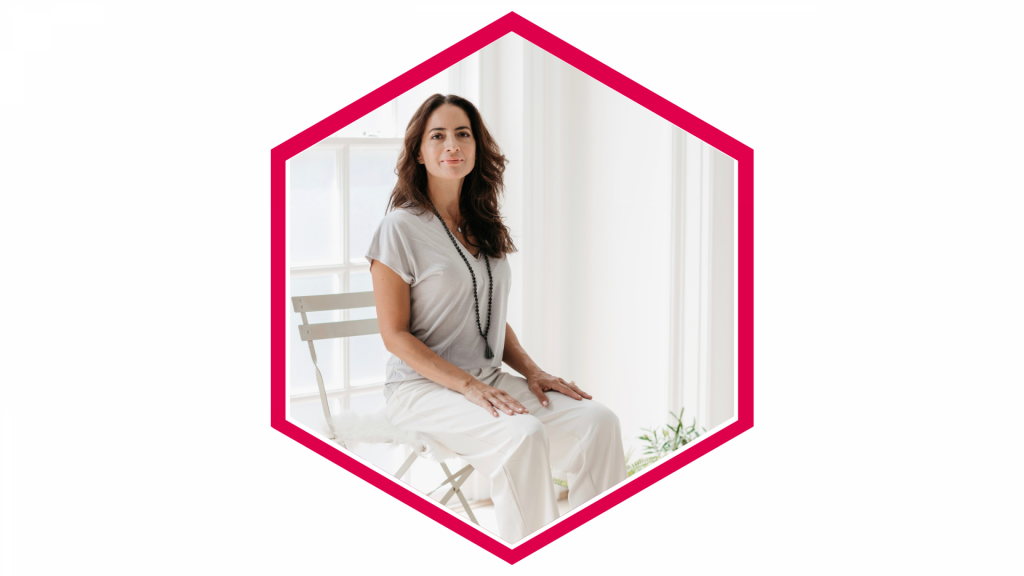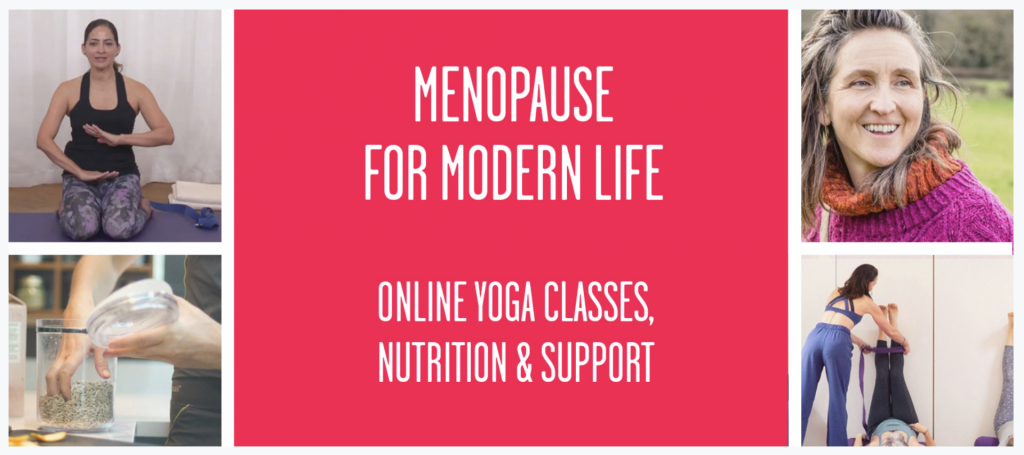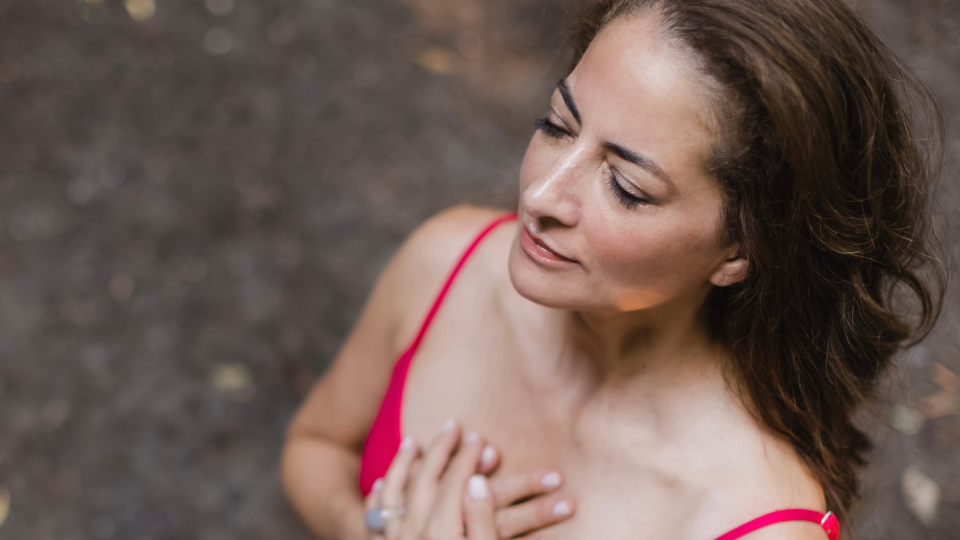
Cultivating strength, balance and ease is at the heart of yoga. It is also fundamental to maintaining bone strength and preventing bone loss as we age.
In this article Gabriella Espinosa explains the importance of looking after our bones as we age. Gabriella reveals how a regular yoga practice, nutrition and lifestyle can support your bone health through menopause and beyond!
Read about how Yoga can support you through Menopause in the MFML Yoga for Menopause Complete Guide!
Why does bone health matter?
Our bones provide a framework of support for our bodies and they allow us to move freely . There are 206 bones in the human body forming a vibrant and evolving matrix of tissue. They protect our vital organs (brain, heart, lungs etc). They also store minerals such as calcium and phosphorus. Bones also produce blood cells that transport oxygen and bolster our immune system.
Strong bones and muscles protect against injury and help us improve our balance, mobility and coordination. This becomes especially important as we get older because it helps to prevent falls and the fractures and broken bones that may result. Essentially, we need healthy bones for health, fitness and longevity.
What happens to our bones as we get older?
The groundwork of our bone matrix is laid by our mid twenties and maximum bone density reached in our 30s. Bones begin breaking down and thinning from our 30s to 40s. Bone loss accelerates in our fifties. This happens as oestrogen levels decline with the onset of menopause and continued gradual loss in older age. According to research, about 10% of a woman’s bone mass is lost in the first 5 years of menopause.
Osteopenia or Osteoporosis?
There are two commonly diagnosed bone conditions that affect women – yes, women are four times more likely to experience them than men. Osteopenia is when your bones become thinner and less dense than normal and can begin to happen from your 30s without any major symptoms. Osteoporosis is more severe bone loss leading to an increased risk of breaks, fractures and loss of spinal flexion.
A woman’s risk of breaking a hip is actually equal to her combined risk of breast, uterine, and ovarian cancer, and the complications that result from hip fracture can be life threatening. Yet we don’t talk about these conditions nearly enough until it is too late and a bone is actually broken or fractured. Dexa Scan or CT Bone Mineral Density Scan can measure both conditions. These determine the current state of your bone density and risk of fracture.
What causes these osteopenia or osteoporosis?
Several factors play a role in developing Osteopenia and Osteoporosis. The more commonly known include: genetics, decrease in oestrogen as women enter menopause and nutrient deficiencies. These include Vitamin D, Calcium and Protein which can play a significant role.
However, there are other contributing risk factors. Cancer treatments such as radiation and chemotherapy, prolonged use of steroids, a history of eating disorders, low body weight, alcohol consumption, smoking and an overactive thyroid.
Optimising Bone Health with Nutrition
If bone health hasn’t been on your radar until now, it’s not too late! You can protect your bones nutritionally by taking the following preventative measures:
- Eat good quality protein with every meal and snack – think lean meats, nuts and nut butters, hemp seeds, beans, lentils, peas, quinoa, teff and spelt
- Consume your calcium rich foods – milk, yogurt, cheese; and non- dairy sources such as almonds, sesame seeds/tahini, tinned salmon or sardines with small bones, spinach, pak choi, kale, broccoli, tofu.
- Ensure you are getting enough Vitamin D either with sunshine or supplementing Vitamin D plus K2 in winter months.
- Reduce caffeine consumption to curb stress levels, lower alcohol intake and don’t smoke.
Read more about Nutrition for Menopause

The importance of movement and balance for Bone Health
Bone health requires weight bearing exercise and active stretching including yoga. When you’re bearing weight through feet and hands and actively engaging your arms, legs, abdominals and gluteus muscles, you are applying stimulating pressure to bone which activates bone strengthening cells. An added benefit is the release of immunity protecting cells located in bone marrow. In addition, working on balance helps develop proprioception – the awareness of your body’s position and movement through the space – which is key to establishing agility and equilibrium to prevent falls.
How can yoga be beneficial to bone health?
A seminal 10 year pilot study of 202 women with osteoporosis showed improved bone density after completing a program of 12 assigned yoga poses practiced for 12 minutes daily.
Another review found that yoga is as effective or better than other forms of exercise at improving muscle strength and flexibility .
Founder of the study, Dr Loren Fishman explains that bone forming proteins synthesise after 10 seconds of stimulating pressure on the bone, so holding yoga poses for at least this long and gradually extending the hold of poses to 30 seconds prove beneficial to strengthening bone.
The Role of Stress and Anxiety
Yoga reduces anxiety and stress, common symptoms which are common symptoms of menopause. This can also be a factor in decreasing bone density by inhibiting osteoblasts – our bone building cells.
My Journey, My Offering
Five years ago, I was diagnosed with Osteoporosis and embarked on a journey of learning all that I could to reverse this. I re-built my bone density with the help of yoga, weight training, nutrition and evidence-backed science.
The Yoga for Strong Bones class I have created on Movement for Modern Life aims to build strength, stability and balance in a gentle and accessible way. It includes poses from Dr Fishman’s study and touches on the key pillars for supporting bone strength – stimulating bones through weight bearing movement, muscular engagement and balance.
I hope this class inspires you to start taking actions to strengthen your bones. As a Women’s Body Wisdom guide, I want to help you start listening to your body. I am here to support you to nourish it in a way that works for you. Often it’s just small manageable changes to your diet and daily routines that make the biggest difference to your health.

This yoga for menopause course brings together specialist contributors and offers yoga classes, audio interviews, facts, guidance and community. The course is suitable for anyone interested in understanding more about menopause, women going through perimenopause and menopause.
Further reading:

Gabriella Espinosa is a menopause and sexual wellness coach, yoga/somatic movement teacher and the founder of Women’s Body Wisdom. Her work is informed by over 15 years of guiding women to know, trust and appreciate their bodies. Her classes are designed to address the common symptoms experienced in menopause, but most importantly they are an exploration of each woman’s unique journey to self-discovery.
Gabriella leads 1-1 and group coaching programs online and facilitates women’s wellness retreats internationally. She contributes her writing on women’s health and yoga to publications in the US and UK. Find Gabriella’s Menopause classes on MFML out find out more http://www.gabriellaespinosa.com





Leave a Reply